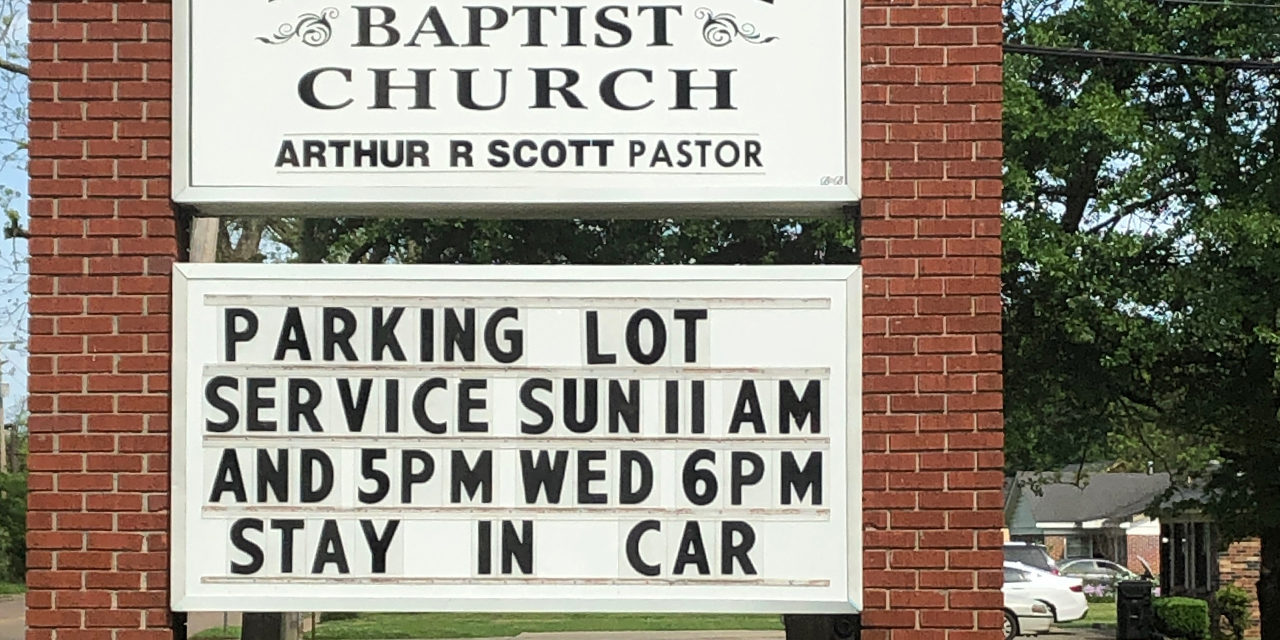Disturbing stories have come in from various parts of the country in the last week of local mayors and other authorities banning not just worship services inside the church, but outside the church in the form of “drive-in” worship services as well. These bans on drive-in church services are a recent development in the war against the COVID-19 pandemic. But they’re also problematic for religious freedom.
Some of the bans were promptly removed after public pressure was brought to bear. In other situations, officials doubled-down and sent police out to break up parking lot services. Lawsuits and restraining orders popped up. Even the U.S. Department of Justice (DOJ) is now involved. What a cultural and constitutional mess!
Everyone is trying to do their part with regard to “stay-at-home” orders and rules for “social distancing” when it comes to holding church. Thanks to Facebook Live and other methods of live-streaming, lots of churches across America are doing church online.
Another innovative method used by some churches is called “drive-in” church. Although there are many ways to do it, the typical drive-in worship service involves church parking lots filled with families in their cars, keeping the windows either closed or mostly closed, staying 6 feet apart, and watching and listening as the pastor preaches from a spot visible to all the cars.
When folks in California’s San Bernardino and Riverside counties and in Wisconsin heard about local efforts to shut down those drive-in church services, they were able to appeal to their governing authorities to get those efforts stopped.
Two churches in Greenville, Miss., tried to hold drive-in services after the mayor specifically banned them. At the Temple Baptist Church, police handed out $500 tickets to each occupant in the cars that showed up. At the King James Bible Baptist Church, several police cars showed up at its drive-in worship service and threated everyone with tickets as they broke up the proceeding.
Temple Baptist Church is suing the city and the mayor to stop the prohibition of drive-in church services. The church is represented by Alliance Defending Freedom, which filed the lawsuit in federal court last Friday.
In Louisville, Ky., Mayor Greg Fischer issued a similar ban on drive-in church services and promised to record the license plates of every car entering a church parking lot to participate in such services. The mayor warned that the names of persons caught violating his order would be turned over to the local public health department for enforcement action, including perhaps mandatory quarantines or even arrest. To add a further chilling effect, he also requested citizens to inform on “their family, friends and neighbors” who broke the rules.
One Louisville house of worship, the On Fire Christian Church, teamed up with the religious freedom lawyers at First Liberty Institute to bring a lawsuit asking a federal judge to issue a restraining order blocking the mayor’s ban. The judge not only granted the restraining order in time to hold an Easter drive-in service, but his opinion did not mince words in condemning the mayor’s unconstitutional action. The beginning of the judge’s opinion is worth quoting here:
“On Holy Thursday, an American mayor criminalized the communal celebration of Easter. That sentence is one that this Court never expected to see outside the pages of a dystopian novel, or perhaps the pages of The Onion. But two days ago, citing the need for social distancing during the current pandemic, Louisville’s Mayor Greg Fischer ordered Christians not to attend Sunday services, even if they remained in their cars to worship – and even though it’s Easter. The Mayor’s decision is stunning. And it is, ‘beyond all reason,’ unconstitutional.”
In addition to the oversight of the courts in individual lawsuits, the DOJ has signaled that it is also watching state and local authorities’ treatment of churches. In an April 11 tweet, the DOJ’s spokesperson, Kerri Kupec, warned:
“During this sacred week for many Americans, AG Barr is monitoring govt regulation of religious services. While social distancing policies are appropriate during this emergency, they must be applied evenhandedly & not single out religious orgs. Expect action from DOJ next week!”
We are in a tricky period where the authority and power of government at all levels has been increased (temporarily) because of the compelling nature of the public health emergency we currently face. But even a pandemic does not signal the end of our constitutional rights. So we walk a difficult line as citizens: respect the government’s role in addressing the coronavirus, because that’s one of the reasons we form governments, but also remind the authorities, by restraining orders if need be, that we are still a Republic with rights granted to us by God, and that restrictions on civil liberties have limits also.
Photo from Alliance Defending Freedom






